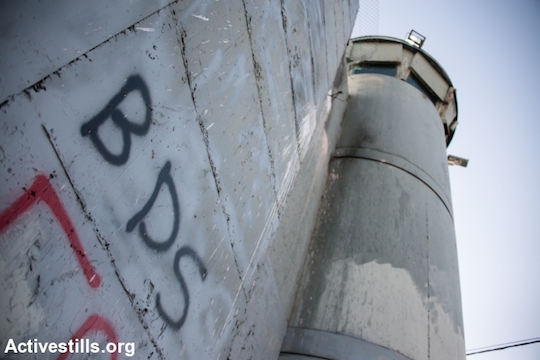The Palestinian-led boycott, divestment and sanctions movement is not about the number of states, it’s about a just outcome that guarantees basic rights for everyone.

Liberal Zionists and progressive Jews have a hard time with the BDS Movement. Many liberal Zionists very much want to support the boycott, divestment and sanctions campaign as a non-violent vehicle for opposing the occupation. Unfortunately, they quickly find that they have difficulties with its clearly-defined goals and tactics, the way it defines those goals, and sadly, the fact that it is a Palestinian-led movement.
Coming at the tail end of countless failed peace processes, BDS (short for boycott, divestment and sanctions) is at the helm of an effort to shift the world’s understanding of the Israeli-Palestinian conflict toward a rights-based discourse. For subscribers of this paradigm shift, the Palestinians’ biggest problem is not the denial of national self-determination. Statehood, or the two-state solution, is a means, not an end in itself. Any political structure that grants Palestinians — and Israelis, for that matter — basic fundamental rights and equality is an acceptable outcome.
The liberal Zionist perspective cannot accept such an approach. In fact, it seems some liberal Zionists cannot even register it. In a recent Haaretz op-ed, Bradley Burston demands a set of crystalized goals from the BDS Movement:
I’m just asking for clear goals. And straight talk. I want to know if BDS wants to encourage two states … or if the goal is a one-state Palestine. I believe that a boycott can only work if its organizers are clear about what they want to achieve.
…
Short of disbanding the country altogether, is there anything that Israel can do, that would satisfy the conditions for an end to the boycott campaign?
Burston’s article is astounding in three ways, all of which are symptomatic of the wider, liberal Zionist community that at least partially defines itself with its opposition to the occupation.
Firstly, the BDS Movement has a website. It may not be the prettiest use of HTML in the history of the Internet, but it is easily navigable and states quite clearly what the movement’s goals and demands are. Here, let me Google it for you. Hell, you don’t even need to Google it: the Wikipedia page on BDS has an entire section outlining its goals.
Second is the binary paradigm through which liberal Zionists insist on viewing the Israeli-Palestinian conflict and any resolution to it: one state or two states. This is not the fault of any one person. Decades of the Oslo Accords, the Clinton Parameters, Bush’s Roadmap and others have reinforced an irrational overconfidence that there is only one solution to the conflict, the outcome of which was preconceived, and which was more or less drawn to along Israel’s terms alone. And so two-state believers have adopted a “with us or against us” attitude, because it’s either two states or bust.
But the biggest, most astounding problem, is that liberal Zionists have trouble supporting BDS — because it is not Zionist. And they’re right; BDS is not a Zionist movement. It does not prioritize Jewish — or Palestinian — self-determination above all else. It does put national rights on equal footing with concepts like ending the occupation, full civil equality (a state by and for all of its citizens), civil rights, suffrage, and the rights of refugees to return to their homes.
And here we arrive at the real, core issue of the liberal Zionist problem with BDS: Palestinian refugees. The third point in the BDS call to boycott, is a demand that Israel, “[respect, protect and promote] the rights of Palestinian refugees to return to their homes and properties as stipulated in UN Resolution 194.”
For defenders of Israel and opponents of BDS, talking about the right of Palestinian refugees to return is tantamount to calling for the destruction of Israel. As illiberal as it might sound, their vision of liberal Zionism includes such concepts as demographic threats to democracy. (Netanyahu was lambasted for having the gall to speak of that threat on election day.) In other words, guaranteeing electoral results by carefully choosing who gets the right to vote. In the United States it’s called gerrymandering; in Israel it is part and parcel of the national ethos.
That is how the peace process came about in the first place. Around the same time that the Apartheid government fell in South Africa, Israeli leaders realized that what they were calling democracy — a regime under which more than 25 percent of the population is denied civil and voting rights — would not enjoy international legitimacy much longer. Yitzhak Rabin and Shimon Peres devised a plan to gerrymander Israel’s democracy so that the outcome of its elections, and therefore the character of its regime, could be guaranteed.
Ironically, it is also one of the main reasons that the peace process has failed. The process, characterized by a vastly unequal power dynamic under the aegis of the United States, has always existed within a framework defined by Israel and Israel alone. A true end to the military occupation (Israel has never considered withdrawing from Jordan Valley, the West Bank’s eastern border) and a comprehensive and just resolution to the Palestinian refugee problem have never been on the table. Those two Israeli sticking points have meant that no prospective two-state deal has ever been acceptable for the Palestinians.
BDS takes those two issues, along with full equality for “Arab-Palestinian citizens of Israel,” and makes them core demands that must be met in whatever political resolution takes shape. It prioritizes individual human and civil rights over national rights that inherently discriminate along ethno-religious lines. And that, is not Zionist.


